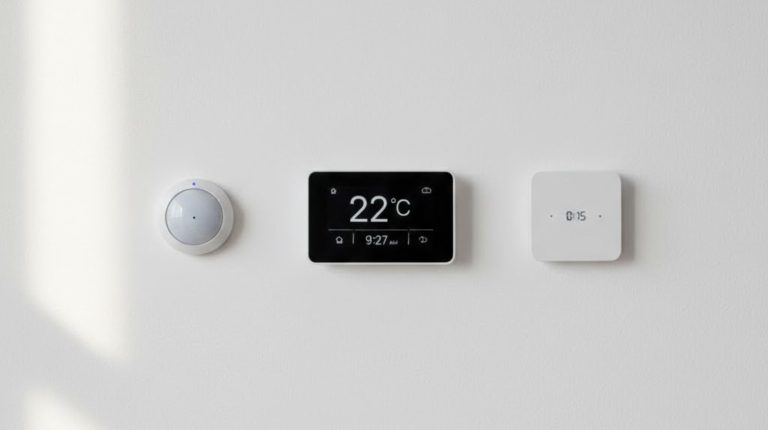Have you ever felt like your appliances are failing you just when you need them the most? Well, you’re not alone. In today’s fast-paced world, we rely on our household appliances to keep things running smoothly. But here’s the thing: appliance lifespans are plunging, and it’s becoming a real concern.
From refrigerators to dishwashers, we’ll explore why this is happening and how you can make your appliances last longer. So, buckle up and join us on this journey to appliance longevity.
Key Takeaways
- Lifespans for major appliances have decreased over the past 25 years due to additional features and decreased commitment to quality control by manufacturers.
- Increased usage at home can also shorten the lifespan of appliances.
- Routine maintenance and proper care can help extend the lifespan of appliances.
- Adjusting freezer and refrigerator settings, using the recommended amount of detergent for dishwashers, skipping self-cleaning cycles for ranges, and using the microwave for its intended purpose can all help prolong the lifespan of each respective appliance.
Factors Impacting Appliance Lifespans
Factors impacting appliance lifespans include usage, maintenance, and manufacturers’ commitment to quality control. Common causes of shortened lifespans are increased usage at home and decreased commitment to quality control by manufacturers.
However, there are preventive measures that can be taken to extend the lifespan of appliances. For refrigerators, adjusting freezer and refrigerator settings to optimal temperatures can maximize lifespan. Dishwashers can be protected by using the recommended amount of detergent and avoiding excessive soap, which can damage seals and mechanisms.
Ovens and cooktops can have a longer lifespan if the self-cleaning cycle is skipped, as it often runs too hot and over-stresses the construction. Microwaves can last longer if they’re used for quick-heating tasks and heavy work is left for the conventional oven.
Refrigerator Lifespan and Maintenance Tips
To maximize the lifespan of your refrigerator, it’s important for us to discuss maintenance tips and strategies. Here are four key steps you can take to ensure your refrigerator stays in optimal condition:
- Regularly clean the condenser coils: Dust and debris can accumulate on the coils, making it harder for the refrigerator to cool efficiently. Cleaning them every six months will improve performance and extend the lifespan.
- Keep the refrigerator well-stocked: A full refrigerator retains cold air better than an empty one. By keeping it well-stocked, you reduce the workload on the compressor, ultimately maximizing its lifespan.
- Check the door seals: Damaged or loose door seals can lead to air leakage, causing the refrigerator to work harder to maintain the desired temperature. Regularly inspect and replace any worn-out seals to ensure efficient cooling.
- Avoid overloading the refrigerator: Overfilling the refrigerator can restrict proper air circulation, making it harder for it to cool effectively. Be mindful of how much you store and ensure proper airflow within the refrigerator.
Dishwasher Lifespan and Care Recommendations
In terms of caring for your dishwasher and maximizing its lifespan, we recommend following these simple maintenance tips.
First, it’s important to troubleshoot any issues that may arise. If your dishwasher isn’t cleaning dishes properly, check the spray arms for clogs or blockages. Additionally, inspect the filter and clean it regularly to prevent buildup and ensure optimal performance.
When it comes to cleaning techniques, avoid using excessive soap as it can damage seals, mechanisms, and even etch dishes. Use the recommended amount of detergent, as encapsulated dishwashing pods already contain rinse enhancers.
Lastly, be mindful of the type of dishes you load into the dishwasher, as certain materials may be more prone to damage.
Range Lifespan: Maintenance and Self-Cleaning Tips
To maximize the lifespan of your range, follow these maintenance and self-cleaning tips:
- Regularly clean the burners and oven: Remove any food debris or spills from the burners and oven to prevent buildup and potential damage. Use a non-abrasive cleaner and a soft cloth to clean the surfaces.
- Avoid using harsh chemicals: When cleaning your range, avoid using harsh chemicals that can damage the surfaces or components. Stick to mild, non-toxic cleaners recommended by the manufacturer.
- Clean the self-cleaning feature: If your range has a self-cleaning feature, make sure to clean it regularly. However, be cautious as self-cleaning cycles can run too hot and over-stress the construction. Consider skipping the self-cleaning cycle occasionally to extend the lifespan.
- Check and replace worn-out parts: Regularly inspect your range for any worn-out parts, such as heating elements or control units. Replace them promptly to ensure optimal performance and prolong the lifespan of your range.
Microwave Lifespan: Proper Usage and Maintenance
Our microwaves, like any other appliance, have a limited lifespan. New microwaves typically last around six years. To ensure a longer lifespan, it’s important to use the microwave properly and perform regular maintenance.
One common issue with microwaves is when they stop heating food. This could be due to a faulty magnetron, capacitor, or diode. To troubleshoot this issue, it’s recommended to check the door switch, thermal fuse, and high voltage transformer.
Another common issue is when the microwave’s turntable stops rotating. This could be caused by a worn-out motor or a malfunctioning turntable coupler. To troubleshoot this, check the motor and coupler for any signs of damage.
Washing Machine Lifespan and Maintenance Guidelines
Let’s delve into the lifespan of washing machines and share some maintenance guidelines. When it comes to washing machine maintenance, there are a few common issues that can arise. To ensure the longevity of your appliance, here are four essential guidelines to follow:
- Regular cleaning: Clean the inside of your washing machine regularly to prevent the buildup of dirt, detergent residue, and mold. This will help maintain its performance and prevent unpleasant odors.
- Balanced loads: Avoid overloading or underloading the washing machine. Follow the manufacturer’s guidelines for load capacity, as this can prevent strain on the motor and other components.
- Proper detergent usage: Use the recommended amount of detergent and avoid using excessive amounts. Overloading the machine with soap can lead to excessive suds, which can damage the machine and affect its performance.
- Timely repairs: Address any issues or malfunctions as soon as they arise. Ignoring problems can lead to further damage and shorten the lifespan of your washing machine. Regular maintenance and prompt repairs can help prevent costly breakdowns and extend the life of your appliance.
Dryer Lifespan: Tips for Extending Its Lifespan
Continuing the exploration of appliance lifespans and maintenance guidelines, we now turn our attention to the dryer and how to extend its lifespan.
Proper dryer maintenance and care are essential for maximizing its longevity. First and foremost, it’s crucial to clean the lint filter after every use. This prevents the accumulation of lint, which can lead to reduced airflow and overheating.
Additionally, regularly inspect the venting system and remove any obstructions that may hinder proper airflow. It’s also advisable to clean the dryer drum and exterior surfaces to prevent the buildup of dirt and debris.
While regular maintenance goes a long way, even well-cared-for dryers can experience issues over time. Some warning signs that indicate it’s time to call a professional include unusual noises, the dryer not heating properly, extended drying times, burning smells, or frequent shutdowns.
For persistent problems like these, relying on the best dryer repair near Clearwater or in nearby areas ensures your appliance is fixed safely and efficiently, helping extend its lifespan.
Lastly, avoid overloading the dryer as this can strain the motor and other components. By following these simple maintenance tips, you can ensure that your dryer continues to function efficiently for years to come.
Oven Lifespan: Maintenance and Common Issues
To ensure the longevity of your oven, we must address common maintenance practices and potential issues that may arise. Here are four key factors to consider:
- Regular cleaning: Proper oven maintenance involves regular cleaning to remove grease and food residue. This prevents the buildup of dirt and ensures optimal performance.
- Temperature calibration: Over time, the oven’s temperature may become inaccurate. Use an oven thermometer to check if the temperature matches the settings. If there’s a discrepancy, recalibration may be necessary.
- Door seal inspection: A faulty door seal can lead to heat loss and uneven cooking. Regularly inspect the seal for any signs of wear or damage. Replace it if necessary to maintain proper heat retention.
- Heating element check: The heating element is a crucial component of the oven. Inspect it regularly for any signs of malfunction, such as uneven heating or visible damage. Replace the element if needed to ensure consistent and efficient cooking.
Air Conditioner Lifespan: Factors and Maintenance Tips
Now, we’ll delve into the lifespan of air conditioners and provide maintenance tips to ensure optimal performance.
Air conditioners typically have a lifespan of 10 to 15 years, but several factors can affect their longevity. One of the most important maintenance techniques is regular cleaning of the air filters. Dirty filters can obstruct airflow and strain the system, leading to decreased efficiency and potential failure.
Additionally, it’s essential to inspect and clean the condenser coils as dirt and debris can accumulate and hinder heat transfer. Another sign of air conditioner failure is inadequate cooling or uneven temperatures throughout the space. If you notice these issues, it’s crucial to check for refrigerant leaks or a malfunctioning compressor.
Regular professional inspections and tune-ups can help identify and address potential problems before they escalate, ensuring your air conditioner performs optimally for years to come.
Tips for Prolonging the Lifespan of Small Appliances
Let’s explore some tips on how we can prolong the lifespan of our small appliances.
Coffee Makers:
- Regularly clean and descale your coffee maker to remove mineral deposits that can affect performance.
- Use filtered water to reduce the buildup of minerals and extend the lifespan of the machine.
- Avoid leaving brewed coffee in the carafe for too long, as it can lead to stains and affect the taste of future brews.
- Replace the coffee filter regularly to prevent clogs and ensure optimal brew quality.
Toaster Ovens:
- Clean the crumb tray after each use to prevent buildup and potential fire hazards.
- Avoid using abrasive cleaners that can damage the interior and heating elements.
- Regularly check the door seals for any signs of wear or damage and replace if necessary.
- Use oven-safe cookware and avoid placing aluminum foil directly on the heating elements to prevent damage.
Frequently Asked Questions
What Are Some Common Issues That Can Shorten the Lifespan of a Refrigerator?
Refrigerator maintenance is crucial to prolonging its lifespan. Signs of refrigerator failure include excessive condensation, warm temperature, and unusual noises. Regularly cleaning the coils, checking the door seals, and adjusting settings can help prevent these issues.
How Can Excessive Soap Damage a Dishwasher and What Are the Consequences?
Excessive soap can damage a dishwasher, leading to shortened lifespan and various consequences. It can harm seals, mechanisms, and etch dishes. Using recommended amounts of detergent and encapsulated pods with rinse enhancers is crucial.
What Are Some Common Parts of a Range That May Need to Be Replaced After 10 Years?
Common range parts that may need replacement after 10 years include the body and electric control unit. Understanding the lifespan of appliances helps us make informed decisions about maintenance and potential repairs.
What Tasks Should Be Avoided When Using a Microwave to Prevent Strain on the Appliance?
To prevent strain on our microwave, we should avoid tasks that could lead to overheating. It’s important to use proper cleaning techniques and follow the manufacturer’s guidelines for safe and efficient operation.
What Are Some Maintenance Guidelines for Prolonging the Lifespan of a Washing Machine?
Maintenance tips for preventing washer damage include regular cleaning of the drum and detergent dispenser, checking and cleaning the filter, avoiding overloading the machine, and using the appropriate amount of detergent.
Conclusion
The declining lifespans of household appliances are a cause for concern. Just like the fragility of a delicate flower, these appliances are becoming more susceptible to failure due to various factors.
By understanding the importance of maintenance and care, we can nurture our appliances and ensure their longevity. Let’s not underestimate the power of proper usage and maintenance, for it’s the key to keeping our appliances blooming and thriving for as long as possible.




